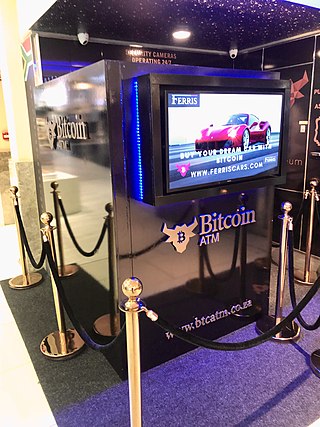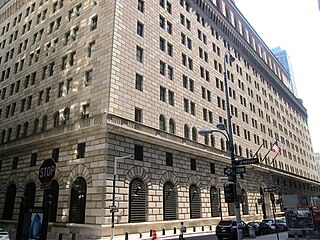Related Research Articles

Money laundering is the process of illegally concealing the origin of money, obtained from illicit activities such as drug trafficking, corruption, embezzlement or gambling, by converting it into a legitimate source. It is a crime in many jurisdictions with varying definitions. It is usually a key operation of organized crime.

An advance-fee scam is a form of fraud and is one of the most common types of confidence tricks. The scam typically involves promising the victim a significant share of a large sum of money, in return for a small up-front payment, which the fraudster claims will be used to obtain the large sum. If a victim makes the payment, the fraudster either invents a series of further fees for the victim to pay or simply disappears.
Bank fraud is the use of potentially illegal means to obtain money, assets, or other property owned or held by a financial institution, or to obtain money from depositors by fraudulently posing as a bank or other financial institution. In many instances, bank fraud is a criminal offence.
A cryptocurrency exchange, or a digital currency exchange (DCE), is a business that allows customers to trade cryptocurrencies or digital currencies for other assets, such as conventional fiat money or other digital currencies. Exchanges may accept credit card payments, wire transfers or other forms of payment in exchange for digital currencies or cryptocurrencies. A cryptocurrency exchange can be a market maker that typically takes the bid–ask spreads as a transaction commission for its service or, as a matching platform, simply charges fees.
Terrorism financing is the provision of funds or providing financial support to individual terrorists or non-state actors.
Virtual currency, or virtual money, is a digital currency that is largely unregulated, issued and usually controlled by its developers, and used and accepted electronically among the members of a specific virtual community. In 2014, the European Banking Authority defined virtual currency as "a digital representation of value that is neither issued by a central bank or a public authority, nor necessarily attached to a fiat currency but is accepted by natural or legal persons as a means of payment and can be transferred, stored or traded electronically." A digital currency issued by a central bank is referred to as a central bank digital currency.

Financial crime is crime committed against property, involving the unlawful conversion of the ownership of property to one's own personal use and benefit. Financial crimes may involve fraud ; theft; scams or confidence tricks; tax evasion; bribery; sedition; embezzlement; identity theft; money laundering; and forgery and counterfeiting, including the production of counterfeit money and consumer goods.
Crime rates in Singapore are some of the lowest in the world, with petty crimes such as pickpocketing and street theft rarely occurring, and violent crime being extremely rare. Penalties for drug offences such as trafficking in Singapore are severe, and include the death penalty.
The parcel mule scam, also known as the reshipping scam, involves scammers and unsuspecting victims handling goods to other countries. In some ways it is similar to the money mule scam. Scammers use fake advertising to hire mules. Items are bought with stolen cards, and since the goods are typically re-sold once shipped, this scam can be viewed as an indirect form of money laundering.

Liberty Reserve was a Costa Rica-based centralized digital currency service that billed itself as the "oldest, safest and most popular payment processor, serving millions all around a world". The site had over one million users when it was shut down by the United States government. Prosecutors argued that due to lax security, alleged criminal activity largely went undetected, which ultimately led to them seizing the service.

Bitcoin ATMs are kiosks that allow a person to purchase Bitcoin and other cryptocurrencies by using cash or debit card. Some Bitcoin ATMs offer bidirectional functionality, enabling both the purchase of Bitcoin and the sale of Bitcoin for cash. In some cases, Bitcoin ATM providers require users to have an existing account to transact on the machine.
A cryptocurrency tumbler or cryptocurrency mixing service is a service that mixes potentially identifiable or "tainted" cryptocurrency funds with others, so as to obscure the trail back to the fund's original source. This is usually done by pooling together source funds from multiple inputs for a large and random period of time, and then spitting them back out to destination addresses. As all the funds are lumped together and then distributed at random times, it is very difficult to trace exact coins. Tumblers have arisen to improve the anonymity of cryptocurrencies, usually bitcoin, since the digital currencies provide a public ledger of all transactions. Due to its goal of anonymity, tumblers have been used to money launder cryptocurrency.
United States virtual currency law is financial regulation as applied to transactions in virtual currency in the U.S. The Commodity Futures Trading Commission has regulated and may continue to regulate virtual currencies as commodities. The Securities and Exchange Commission also requires registration of any virtual currency traded in the U.S. if it is classified as a security and of any trading platform that meets its definition of an exchange.

Carding is a term describing the trafficking and unauthorized use of credit cards. The stolen credit cards or credit card numbers are then used to buy prepaid gift cards to cover up the tracks. Activities also encompass exploitation of personal data, and money laundering techniques. Modern carding sites have been described as full-service commercial entities.

The Bangladesh Bank robbery, also known colloquially as the Bangladesh Bank cyber heist, was a theft that took place in February 2016. Thirty-five fraudulent instructions were issued by security hackers via the SWIFT network to illegally transfer close to US$1 billion from the Federal Reserve Bank of New York account belonging to Bangladesh Bank, the central bank of Bangladesh. Five of the thirty-five fraudulent instructions were successful in transferring US$101 million, with US$81 million traced to the Philippines and US$20 million to Sri Lanka. The Federal Reserve Bank of New York blocked the remaining thirty transactions, amounting to US$850 million, due to suspicions raised by a misspelled instruction. As of 2018, only around US$18 million of the US$81 million transferred to the Philippines has been recovered, and all the money transferred to Sri Lanka has since been recovered. Most of the money transferred to the Philippines went to four personal accounts, held by single individuals, and not to companies or corporations.
Alexander Vinnik is a Russian computer expert. From 2011 to 2017, he worked at BTC-e, a Russian cryptocurrency exchange.

Cash App is a mobile payment service available in the United States and the United Kingdom that allows users to transfer money to one another using a mobile phone app. In February 2023, the service reported 51 million monthly transacting users and US$10.6 billion in annual revenues.
Cryptocurrency and crime describe notable examples of cybercrime related to theft of cryptocurrencies and some methods or security vulnerabilities commonly exploited. Cryptojacking is a form of cybercrime specific to cryptocurrencies that have been used on websites to hijack a victim's resources and use them for hashing and mining cryptocurrency.
Ramon Olorunwa Abbas, commonly known as Hushpuppi, Hush, or Ray Hushpuppi is a Nigerian former Instagram influencer and convicted felon. He was sentenced in the United States to 11 years for conspiracy to launder money obtained from business email compromise frauds and other scams, including schemes that defrauded a US law firm out of approximately $40 million, illegally transferred $14.7 million from a foreign financial institution, and targeted to steal $124 million from an English Premier League club.
The Bitfinex cryptocurrency exchange was hacked in August 2016. 119,756 bitcoin, worth about US$72 million at the time, were stolen.
References
- 1 2 Cooper, Luke (3 August 2007). "This Is The Unusual Money Laundering Method Of 'Cuckoo Smurfing'". Huffington Post. Retrieved 17 April 2019.
- ↑ "Fake Job Offers". ThatsNonsense.com.
- ↑ Tehrani, Rich (June 23, 2016). "FBI: Beware New Email Scam".
- ↑ "banksafeonline.org - Bank Safe Online" . Retrieved 2010-03-05.
- ↑ "Is everything we know about password-stealing wrong?" (PDF). Retrieved 2015-03-14.
- ↑ "ThatsNonsense.com - Reshipping Scams" . Retrieved 2010-03-05.
- ↑ Brian Krebs (September 29, 2016), "'Money Mule' Gangs Turn to Bitcoin ATMs", Krebs on Security (blog)
- ↑ "Lloyds TSB - Money Mule" . Retrieved 2010-03-05.
- ↑ "Manhattan U.S. Attorney Charges 37 Defendants" . Retrieved 2017-02-24.